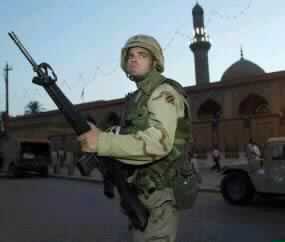- Author:
News Agencies - Section:
WORLD HEADLINES
Occupation Forces Bolster Patrols in Iraq

Reinforcements were on their way to bolster US-led occupation forces in northern and western Iraq after a series of attacks, as a new team of experts arrived to search for evidence of banned nuclear, chemical and biological weapons. Troops from the US Third Infantry Division were being dispatched to the Sunni Muslim tribal belt west of Baghdad and the mainly Shiite northeastern province of Diyala, scenes of recent attacks on US troops.
"We are applying additional military resources and forces to enable us to identify and address these anti-coalition and, I might add, "anti-Iraqi elements"," said Lieutenant General David McKiernan, top coalition field commander.
The beefed-up presence would also include a "hearts-and-minds" campaign to counter Iraqi anger over the conduct of US search operations, particularly those involving women, said McKiernan.
Meanwhile, the first members of a new team of 1,300 to 1,400 Australian, British and US experts arrived in Baghdad to begin a new search for evidence of banned weapons.
The team, which British Prime Minister Tony Blair said is to include former UN arms inspectors, will remain in Iraq as long as it takes to uncover Saddam Hussein's secret weapons programs, McKiernan said.
The United States is insisting on carrying out its own weapons search and has barred the UN teams from returning to Iraq.
However, the International Atomic Energy Agency has been allowed to send a seven-member team to investigate whether radioactive material had been stolen by looters in the chaos after the fall of the Baath party regime. The team is scheduled to arrive Friday in Baghdad.
Washington and London cited reports of Iraq's attempts to develop nuclear, biological and chemical weapons as the principal justification for war, but little evidence has emerged to back up the claims.
The lack of evidence has put both Blair's government and the administration of US President George W. Bush on the defensive against claims they manipulated intelligence reports to bolster their case for war.
In Ottawa, Canada announced it would lift its sanctions on Iraq, the latest nation to do so after a May 22 UN Security Council vote authorized such actions.
Meanwhile, a coalition adviser said the Baghdad museum, looted of priceless antiques after Saddam's ouster, should reopen by September to exhibit the fabled "treasure of Nimrod" collection, which has not been seen for more than a decade.
Retired Italian ambassador Piero Cordone, the coalition's adviser on cultural affairs, said he would soon check to see if the collection, considered one of the best finds of the 20th century after Tutankhamen's tomb in Egypt, is safe in the Iraqi Central Bank vaults.
The 650 bracelets, necklaces, royal tiaras, golden objects and semi-precious stones were placed in the vaults during the 1990-1991 Gulf War.
"We will check they are still there, do an inventory, clean them and then put them on show. It's an exceptional collection," Cordone said.
The treasure was discovered by Iraqi archaeologists in 1988 and 1989 in the tombs of Assyrian queens and princes from the 8th and 9th centuries BC, said Beatrice Andre Salvini, head curator of Oriental antiquities at the Louvre museum in Paris.
**PHOTO CAPTION***
A US Army soldier front of the Abu Hanifa mosque in Baghdad. (AFP/File/Timothy A. Clary)


 Home
Home Discover Islam
Discover Islam Quran Recitations
Quran Recitations Lectures
Lectures
 Fatwa
Fatwa Articles
Articles Fiqh
Fiqh E-Books
E-Books Boys & Girls
Boys & Girls  Women
Women









